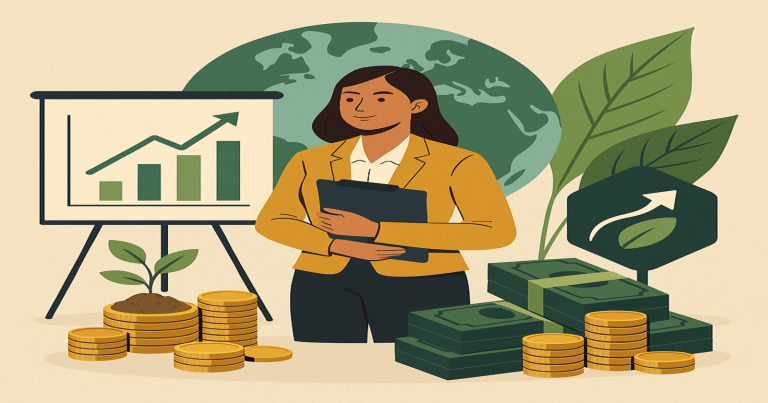Climate change, a global crisis of unprecedented scale, necessitates the management of finances for clean energy, water safety, and nature protection. In this context, the significance of climate finance courses cannot be overstated. These courses equip individuals with the knowledge and skills to utilize finance and investment for mitigating climate issues. They are instrumental in fostering an understanding among students, professionals, and policy workers on how to leverage financial resources for a sustainable future. These courses teach you about carbon markets, green bonds, ESG investing, and sustainable banking. They also explain how to plan climate projects, get funding, and measure impact. You don’t need to be an expert to join.
Why Climate Finance Courses Matter Today?
Climate change affects everyone. Floods, heat, and pollution are getting worse. Governments and companies now spend a lot of money on green projects. But they need trained people to plan and use that money well. That is why climate finance is a new career path.
People often think climate work is only for scientists or activists. That is not true. Finance plays a big role in climate action. Countries need experts who know how to handle climate funds, track carbon projects, and guide green loans.
Climate finance courses train people to handle all this. These courses explain how to use financial tools like green bonds, climate funds, and ESG models. You also learn how to help cities and villages build clean energy and manage climate risks.
Benefits of learning climate finance:
- You help the world reduce climate damage
- You build a future-ready career
- You work with big firms, banks, or UN bodies
- You learn about carbon trading and green investing
- You get better job roles and salaries in a new field
In 2025, climate jobs are rising fast. Companies must follow climate rules. Governments need finance experts. These courses make you ready for all these roles.
What Do Climate Finance Courses Teach?
These courses cover many useful topics. They help you understand the link between money and the environment. They teach real tools to support climate projects and policies.
Courses start with basic climate science. Then, they move to finance tools. You learn how to plan budgets for green projects and how to report carbon use. Most courses also explain international funds and finance policies.
| Module | What You Learn |
| Basics of Climate Change | Global warming, causes, effects |
| Sustainable Finance | ESG, SDGs, climate-friendly banking |
| Climate Project Design | Planning, budgeting, risk tools |
| Green Investment | Green bonds, blended finance |
| Carbon Markets | Offsets, trading, credits, pricing |
| Climate Policy | Paris Agreement, global frameworks |
| Impact Assessment | Project tracking, KPIs, climate reports |
| Climate Risk Finance | Risk models, disaster finance, insurance |
Most courses also teach Excel, data tools, carbon calculators, and reporting formats. You also learn how to talk to clients, prepare reports, and make decisions.
By the end, you can work on real climate projects in banks, companies, or global NGOs.
Who Can Take Climate Finance Courses?
Anyone who wants to work in green finance or climate jobs can join these courses. You can come from any background—finance, science, economics, or engineering. Many people want to help the planet but don’t know where to start. These courses give them clear steps. If you care about the Earth and want to work in finance, these courses help you build both knowledge and a career.
- Commerce & BBA students – Add green skills to your finance base
- Economics & Policy students – Understand global frameworks and funding
- Engineers – Build project-level skills in energy or water
- Bankers & finance professionals – Move into green lending
- NGO workers & planners – Learn climate finance tools
- Freshers or career changers – Enter a growing, future-safe field
Courses are designed in simple English. You can study full-time, part-time, or online. You can choose beginner or expert level based on your background.
Some courses also prepare you for jobs in green finance consulting, carbon markets, and climate policy planning.
Types of Climate Finance Courses Available
There are many kinds of courses. Some teach theory. Some offer job-ready skills. Some are short and online. Others are full degree programs.If you want a quick overview, pick a short course. If you want a full career shift, do a diploma or a master’s. You can also do stackable certificates.
| Course Type | Duration | Best For |
| Online Certificate | 4–8 weeks | Beginners, working adults |
| Postgraduate Diploma | 6–12 months | Freshers or career switchers |
| Master’s in Climate Finance | 1–2 years | Full-time students |
| Executive Program | 3–6 months | Mid-level professionals |
| Skill India Climate Modules | 2–6 months | Rural or entry-level learners |
Some platforms like edX, Coursera, and UN CC: Learn to offer free options, too. You can also check IGNOU, NPTEL, and NSDC for budget-friendly Indian courses.
You can also combine climate finance with other topics like sustainability reporting, CSR strategy, and green fintech.
Top Platforms and Universities Offering Climate Finance Courses
Many top global and Indian institutes now offer these courses. You can study from home or join a full-time campus course. Some universities also give double degrees, job support, and project internships. Online courses also offer self-paced options.
| Name | Course Offered | Mode |
| University of Oxford | MSc in Sustainability, Enterprise & Environment | Full-time |
| London School of Economics | Certificate in Climate Finance & Policy | Online/Hybrid |
| Frankfurt School | Green & Sustainable Finance Program | Online |
| Yale University | Financing and Deploying Clean Energy | Online (Coursera) |
| UN CC:Learn | Climate Finance Training | Free Online |
| TERI School of Advanced Studies | PG Diploma in Climate Policy & Finance | India, Full-time |
| Skill India | Green Finance Modules | Free/Low-cost, India |
Check course details, fees, reviews, and job results before choosing. Look for options with practical assignments, case studies, and alumni support.
Career Scope After Climate Finance Courses
These courses open jobs in green banks, policy groups, investment funds, and development bodies. You can also work in CSR, consulting, or fintech. Many companies now hire people who understand carbon tracking, green bonds, and ESG. Countries also need experts to help use global climate funds.
| Job Title | Industry | Salary (Monthly) |
| Climate Finance Analyst | Banks, NGOs | ₹40,000 – ₹1,20,000 |
| ESG Reporting Executive | Corporate | ₹50,000 – ₹1,00,000 |
| Green Investment Advisor | Investment Firms | ₹60,000 – ₹1,50,000 |
| Carbon Project Manager | UN, CSR Firms | ₹70,000 – ₹2,00,000 |
| Sustainable Finance Consultant | Big4, Startups | ₹60,000 – ₹1,80,000 |
Jobs exist in India and globally—in banks, UN offices, cleantech startups, and more. With time, you can lead climate finance teams or start your consultancy.
How to Choose the Right Climate Finance Course?
Before picking a course, know your goal. Some courses give jobs. Some are academic. Some focus on policy. Others teach business finance. Think about where you want to work—bank, NGO, MNC, or government. Then, check the course subjects, duration, and fees.
Checklist:
- Check if the course is beginner or advanced
- Look for job or project support
- Pick trusted platforms with real trainers
- Check student reviews
- Ask about certifications
- Compare syllabus with industry needs
- Make sure it teaches real tools and reporting
If you’re still unsure, start with a short online course. Then, move to a diploma or degree after gaining confidence.
Climate Finance Courses FAQs
1. What is the main use of climate finance courses?
They help you learn how to plan and manage money for climate action projects.
2. Who should take these courses?
Students, bankers, project planners, NGO workers, and anyone interested in green finance.
3. Are these courses available online?
Yes. Many global and Indian platforms offer online and self-paced learning.
4. What are the job options after this course?
You can work in green banking, carbon consulting, ESG reporting, and climate risk finance.
5. Do I need a finance background to join?
No. You can start even if you come from science or humanities.
6. Are there free courses in this field?
Yes. UN CC: Learn and Skill India offers some free or low-cost modules.


